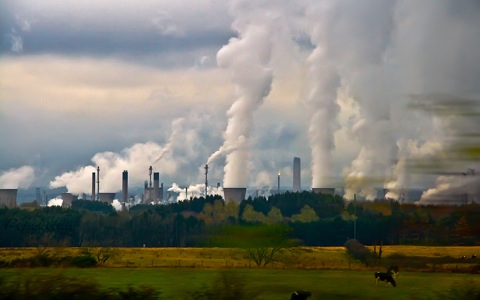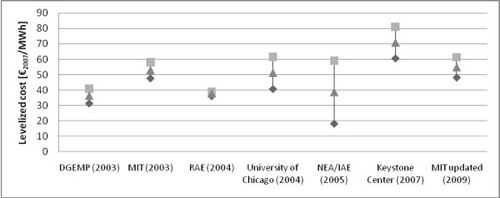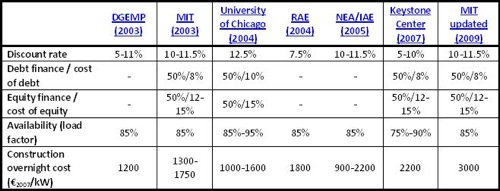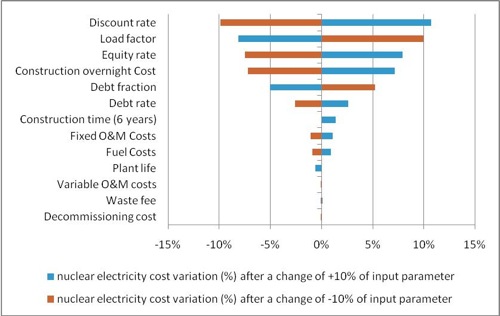Nuclear generation costs - revisiting estimates (once again)
10 Nov, 2009 02:06 pm
The debate about the true level of nuclear electricity generation cost is far to be closed. The estimates are regularly reviewed and updated. In the same time, new nuclear builds provide new data. The newest observations stimulate a question about the possible impact of the recurrent cost overruns and delays in on-going construction of EPRs on the electricity generation cost and the competitiveness of nuclear power.
 |
As presented in figure 1, the findings of the studies considerably differ. The cost estimates vary from 18 €2007/MWh to 80 €2007/MWh. Furthermore, more recent reports tend to provide higher cost estimates: average value for studies published in 2003-2005 is about 43 €2007/MWh, much lower than average of studies published in 2007-2009 of about 63 €2007/MWh.
 |
Why are the findings of the seven studies so different? The obvious reason is that, as shown in the table below, the studies are based on different hypotheses regarding main cost drivers.
 |
The other reason for the differences between the seven studies is that the levelized cost model applied to highly capital intensive technologies such as nuclear power generation is very sensitive to key input parameters. Figure 2 plots the results of a nuclear electricity cost sensitivity analysis modifying, one to one, each input parameter by 10% and -10%. This has been made using the levelized cost (Excel) model from the MIT (2009) study. As shown in the figure 2 the most important parameters are: the discount rate (and other parameters influencing the discount rate as the equity rate or the dept fraction), the availability (load factor), and the construction overnight cost.
 |
Among the three most important parameters of the levelized cost model (the discount rate, the availability and the construction cost) the construction cost is the parameter mostly debated because of its huge evolution since 2000. Analysts often refer to the construction costs as to “overnight cost” or undiscounted capital outlays. This is the cost that will be realized if the power plant could be built instantaneously or during one night. It does not incorporate financing charges and inflation during the construction time.
Nuclear overnight construction costs are hard to estimate ex-ante. One clear lesson from the history of nuclear power is that forecasted costs are invariably lower than actual costs incurred during plant construction. Furthermore, generic cost estimates (i.e., cost estimations not addressing a specific power plant investment but a nuclear technology cost), such as those regularly provided by industry trade associations, are always lower than estimates provided by companies that are involved in actual projects such as vendors or utilities (Cooper 2009).
Construction costs have been sharply rising since three decades. This has been true for power plants being built and for reports assessing nuclear costs. When the Generation III+ designs were first being discussed, the nuclear industry strongly argued that these could be built for an overnight cost of US$1,000/kW (~750 €/kW), so that a plant of 1,000 MW would cost US$1bn. Early nuclear power economics studies used construction cost estimations below 2,000 €2007/kW and sometimes below 1,000€2007/kW. For instance, the MIT study published in 2003 assumed an overnight cost of 1,750 €2007/kW for its base case. More recent studies use higher construction costs. The Keystone Center study used an estimation of overnight cost of about 2,200 €2007/kW. The updated version of the MIT report made significant changes concerning overnight construction cost using a new cost estimation of about 3,000 €2007/kW.
These estimations may be compared with construction costs of nuclear plants in Europe, Japan and Republic of Korea. Two 1,600 MW nuclear power plants are being constructed in Europe: Olkilouto in Finland and Flamanville in France. In case of Finland, at the time the contract was signed, the value was estimated at about €3bn (that is about 1,900 €/kW). By March 2009 the project was acknowledged to have a delay of at least three years and to be €1.7bn over the budget. It is now expected to cost about 3,000 €/kW.
Another example is the case of EPR in Flamanville where construction started in December 2007. In May 2006, EDF estimated the cost at €3.3bn. At that time, this was 2,000 €/kW. Recently EDF acknowledged that the expected construction costs for Flamanville had increased from €3.3 billion to €4 billion giving an overnight construction cost of about 2,500 €/kW (Scheider et al 2009).
The overnight costs have been also recently measured for new Japanese and Korean power plants. The overnight costs on these units range between 1,800 and 2,500 €/kW (Du and Parson 2009).
The recent experiences in the construction of nuclear power plants suggest that the actual overnight costs should be closed to the highest estimates provided by the seven studies discussed at the beginning of this blog entry. This implies that the electricity generation cost estimations for new nuclear power plants, ceteris paribus, would range between 50 and 80 €/MWh., which has at least two consequences. Firstly, the range of cost is far higher than suggested by the old estimations made when “nuclear renaissance” had just started and alternative technologies were expensive. Secondly, uncertainties concerning the true costs of nuclear are still high and competitiveness of nuclear power will depend on how these uncertainties will be resolved.
Originally published on EU Energy Policy Blog
-
12/12/12
“Peak Oil” is Nonsense… Because There’s Enough Gas to Last 250 Years.
-
05/09/12
Threat of Population Surge to "10 Billion" Espoused in London Theatre.
-
05/09/12
Current Commentary: Energy from Nuclear Fusion – Realities, Prospects and Fantasies?
-
04/05/12
The Oil Industry's Deceitful Promise of American Energy Independence
-
10:00
Shaky Foundations for Offshore Wind Farms







Best Deal